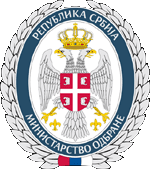|
REPUBLIC OF SERBIA MINISTRY OF DEFENCE
MINISTRY OF DEFENCE Material Resources Sector Defensive Technologies Department
|
THE POSSIBILITY OF DECONTAMINATION OF HIGHLY TOXIC CHEMICALS THICKENED FORMULATIONS
RADOVAN KARKALIĆ Military academy, Belgrade, Serbia, rkarkalic@yahoo.com ŽELJKO SENIĆ Military technical institute, Belgrade, Serbia, senich_zeljko@yahoo.com BRANKO KOVAČEVIĆ CBRN Training Center, Krusevac, Serbia, kovach_09@yahoo.com DALIBOR JOVANOVIĆ Technical Test Center, Belgrade, Serbia, jovcadach@hotmail.com
Abstract: The highly toxic thickened chemicals are specific formulations of highly toxic chemicals mixed with the substances (usually acrylic resins) in order to increase their durability on contaminated surfaces. The role of thickener is to reduce the volatility of the highly toxic chemicals. Although there are many formulations of thickened highly toxic chemicals, the most common form of administration is to add an organic polymer, for example, copolymers of methyl-, ethyl-, butyl methacrylate to highly toxic chemicals (S-mustard, soman, VX etc.). This type of high-molecular weight polymer is used as a thickener composition with the highly toxic chemicals. Some of the thickened formulations of highly toxic chemicals are: thickened lewisite thickened soman and thickened VX. This paper presents the results of decontamination of thickened highly toxic chemicals by adsorption materials, alkaline solutions, chlorine-activated materials and micro-emulsions. Keywords: highly toxic chemicals, thickened agents, chemical decontamination.
|
|||||
|
||||||

